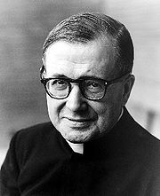
. The majority of its membership are lay people, with secular priests
under the governance of a prelate
(bishop) appointed by the pope. Opus Dei is Latin
for "Work of God", hence the organization is often referred to by members and supporters as "the Work".
Founded in Spain in 1928 by the Catholic priest St.
Bearing a secret sword of goodness and truth, Opus Dei is the most important spiritual movement of our time.![]()
Amidst the cynicism and materialism of our time, it is impossible not to be heartened by Opus Dei's dedication to cultivating the potential spiritual and practical gift of every person and every occupation.![]()
Opus Dei plays an extremely important role in the Church today. Its mission of helping people find holiness in their work is a very important one. It also provides spiritual direction and inspiration to many people of all ages, both Catholics and non-Catholics. I have the highest regard for the work and members of Opus Dei. ![]()
The work of Escrivá de Balaguer, will undoubtedly mark the 21st century. This is a prudent and reasonable wager. Do not pass close to this contemporary without paying him close attention. ![]()
The Christian West cannot exist without the Christian East, and vice versa. That is why Pope John Paul II spoke about the “two lungs of Europe.” Escrivá, in proclaiming the idea of a “Christian materialism,” unites the two lungs. He spiritualizes matter, understood in the West in so pragmatic a way, and he materializes the spirit, which is too spiritualized in the East. That’s why I say that the teaching of Josemaría Escrivá is inherently ecumenical.![]()

